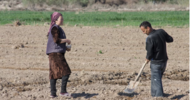Codes of conduct don’t work, said Devinder Sharma of Forum for Biotechnology and Food Security, Delhi. “It is unethical to grab land in other countries; it will lead to food crisis as investor countries will grow food for profit.”
- Down to Earth
-
17 June 2009
Due to the lack of arable land in its home market, Savola must look abroad for agricultural land and has named Sudan, Egypt, Ethiopia and Ukraine as target countries where it plans to buy the land necessary to grow seeds such as sunflower and corn seeds.
- PR-inside
-
18 November 2008
Egypt has agreed with Sudan to study a plan to grow crops together on Sudanese land within the framework of economic cooperation between the two countries.
- Al-Monitor
-
16 September 2020
Kenya’s biggest flower firm is set to go under the auctioneers’ hammer, as owners of the Indian multinational failed to defend the winding up petition filed in court by creditors.
- Daily Nation
-
04 April 2016
Financial investors own tracts that grow maize and soya beans in Illinois and Uruguay, almonds and cattle in Australia, and sugar beets and wheat in Poland. Some are venturing into countries with potentially volatile politics, such as Ethiopia and Ukraine.
Africa must be developed in a rush in order to avoid a global food crisis with huge changes, including a confrontation with chiefs, the role of women and the views on collective property, says Danish Minister for Development Cooperation.
Mozambique’s President Armando Guebuza has rebuffed allegations that land-grabbing has taken place along the Nacala Corridor under the Japanese and Brazilian-supported ProSavana agriculture project in the north of the country.
- Southern Times
-
10 June 2013
As ratings agencies and risk insurers increasingly factor in land tenure risk to their premiums, investors need to be aware of the potential costs that might be incurred through disruption, sabotage or loss of assets and the further possibility that the strong-arm tactics used by some African states to resolve disputes could invalidate or seriously impact on the level of insurance cover.
- Aegis Advisory
-
12 Mar 2013
Up to 90% of sub-Saharan Africa's land area is currently untitled. Without legal owners, this land falls to the state, which makes it easy to lease to foreign investors
Corporate agriculture is not about food production or satisfying the needs of the undernourished or downright starving but about producing profit. How long can it be before its limits are reached?
- worldsocialism.org
-
11 November 2011
Pension funds may be one of the few classes of land grabbers that people can pull the plug on, by sheer virtue of the fact that it is their money.
As the G20’s agriculture ministers arrived in Paris for a two-day meeting, more than 500 non-governmental organisations from around the world have delivered a petition calling for a halt to land grabbing under the guise of “responsible agricultural investment”.
Indian company signs an MoU with Zambia Development Agency to facilitate the acquisition of 100,000 hectares of land for agricultural development in Zambia.
- Equity Bulls
-
01 December 2010
NCB Capital estimates that Saudi Arabia and the United Arab Emirates, the main buyers of African land, have acquired some 6 million acres worldwide, largely in Sudan, Pakistan and Indonesia. Other estimates are much higher.
Listening to Susan Payne you could be forgiven for thinking land funds are a holy grail for the ethical investor: money-making opportunities with a sanctifying air of do-goodery.
- The Spectator
-
13 February 2010
The consensus is that Africa is being out-gunned. While regulations & rules are debated, the amount of land being bought up by foreign investors is increasing at a rapacious speed.
- Deutsche Welle
-
13 August 2009
It is essential that governments and international agencies act now to create not only a uniform code of conduct guiding foreign land acquisitions, but also an enforcement mechanism.
- World Politics Review
-
05 August 2009
An agricultural investment firm owned by the Saudi government will focus on investing abroad to cultivate mainly wheat, rice, sugar and soybeans, a senior agriculture ministry official said on Monday.
An analysis of the global impact of a Thai court judgement, which provides a judicial forum to farmers from Cambodia, who were victims of transnational land grabbing.
- Global Policy
-
19 August 2020
The British government is ramping up its policy to divert taxpayers’ money into private hands and plantation companies like Feronia – and away from the world’s poorest people, warns Labour’s Dan Carden.
- New Internationalist
-
20 January 2020
Swedish investor EcoDevelopment registered a claim at the International Centre for Settlement of Investment Disputes against the Tanzanian government on September 11, 2017 for revoking a land title amid concerns over the impact on local communities and a wildlife sanctuary.
Lorenzo Cotula discusses highlights from his latest academic piece, in which he explores whether investment treaties protect 'land grab' deals, and how these impact the land rights of rural people.
- Land Portal
-
20 October 2016
Turkey plans to lease farmlands in African countries as thousands of its own farmers have gone out of business amid decreased government support and an aggressive construction drive swallowing arable lands.
Investors have poured tens of millions of dollars into a war torn landscape in northern Uganda now dotted with tracts of maize, rice, sunflower, sesame and commercial forests.
Lagos State government says states acquiring land for food production in other places has become "global practice everywhere".
- New Telegraph
-
15 October 2014
The Liberian government has leased nearly 6 per cent of Liberia’s total land mass to palm-oil companies. More than a million people live on those lands, and 150,000 will be affected in the first five years of the plantations.
- Globe and Mail
-
27 September 2012
Tanzanian peasaants complain that the government has been allocating huge tracts of land to certain investors in the district, while refusing to allocate the same pieces of land to local groups that had applied for them.
- The Citizen
-
03 November 2011
The Arab unrest has only doubled the efforts of Gulf countries to secure food production by buying farmland around the world, as they try to buffer themselves from the economic issues that have destabilized the region.
- Knowledge@Wharton
-
22 Mar 2011
Rural people in several parts of Cameroon are protesting a government policy that allows the government to sell or lease vast parcels of arable land to foreign investors.
If all these land deals will be beneficial to Pakistan in the long run, why is the government refusing to divulge the details of what is the citizens’ common property?















